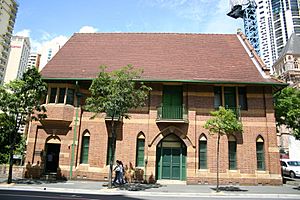Church House, Brisbane facts for kids
Quick facts for kids Church House, Brisbane |
|
|---|---|

Church House, 2009
|
|
| Location | 417 Ann Street, Brisbane City, City of Brisbane, Queensland, Australia |
| Design period | 1900 - 1914 (early 20th century) |
| Built | 1909 |
| Built for | Anglican Diocese of Brisbane |
| Architect | Robin Dods |
| Architectural style(s) | Gothic, Arts & Crafts |
| Official name: Church House | |
| Type | state heritage (built) |
| Designated | 21 October 1992 |
| Reference no. | 600077 |
| Significant period | 1909 (fabric) |
| Lua error in Module:Location_map at line 420: attempt to index field 'wikibase' (a nil value). | |
Church House is an old office building in Brisbane City, Queensland, Australia. It's located at 417 Ann Street, right within the grounds of St John's Cathedral. A famous architect named Robin Dods designed it, and it was built in 1909. Today, it's recognized as a special historical building on the Queensland Heritage Register.
History of Church House
In 1899, the Church of England bought land on Ann Street. Their plan was to build St John's Cathedral, a school, and offices. Church House was built in 1909. It was designed by Robin Dods, who was the architect for the church at the time.
The building was meant to be the main offices for the Anglican Diocese of Brisbane. It was the first part of a bigger plan. The full design would have made the building L-shaped. It would have created a small, enclosed area around St John's Cathedral. Other architects praised the design. It was even shown at a big art exhibition in London in 1910.
Church House is still used as offices today. It holds the church's historical records. It also houses the Anglican Schools Commission. In the past, many other church groups used the building. These included the Anglican Board of Missions and the Mothers Union.
What Church House Looks Like
Church House is a two-storey building. It's made of brick with some stone details around the windows. The roof is very steep and covered with tiles. One end of the roof has a low wall, called a parapet. The other end shows where the building was meant to be extended later.
The building's overall shape looks like Gothic style. You can see this in its tall, steep roof and narrow windows. However, it also has strong influences from the Arts and Crafts movement. This style focuses on traditional craftsmanship.
The front of the building, facing Ann Street, has interesting features. The upper floor has three concrete balconies that stick out. They have decorative iron railings. There's also a special window that sticks out, called an oriel window. The roof's edges hang over the walls. This creates a sunshade around the building.
The windows on the upper floor are square-shaped. But the windows on the lower floor have pointed, Gothic arches. There's also a side door with a rounded arch. The main entrance from Ann Street is a wide, pointed arch. It has stone decorations. Inside, most of the original parts of the building are still there. Some modern changes include new walls and air-conditioning.
Why Church House is Important
Church House was added to the Queensland Heritage Register on 21 October 1992. This means it's considered a very important historical place.
- Part of Queensland's History: Church House shows how the Anglican Church has grown in Brisbane since 1904.
- Great Design: The building has a very well-thought-out design. It combines the Arts and Crafts style with Gothic elements. It fits perfectly with the other church buildings around it.
- Creative Achievement: Its design shows a high level of creativity and skill for its time.
- Connected to a Famous Architect: Church House is an important example of the work of Robin Dods. He was a very important architect in Brisbane's history.
 | Bayard Rustin |
 | Jeannette Carter |
 | Jeremiah A. Brown |

